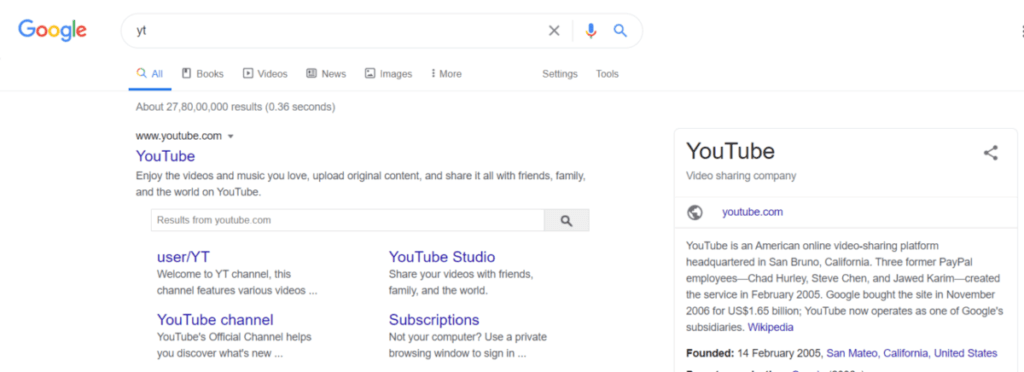2 trillion. That’s the number of Google searches PER DAY! But how do they manage such sheer volumes and how does Google make money if it’s free? Today, let’s decode the Google business model and take an insider view of the revenue sources for Google.
How does Google make money?
Google makes money through Adwords. It allows businesses to display contextual ads in the search results and charges on a per-click basis. Apart from this, Google also earns money from its infrastructure business including Google Cloud, Firebase, and others.
You may also like: How Does Brave Browser Make Money? [Revenue Model]
About Google’s Business
Their current market cap is USD 1 Trillion. But, how in the world are they earning their billions? Who pays them if you don’t? There’s a popular quote among marketers and many startup founders across the globe.
If you’re not paying for a product, you are the product.
“So they’re selling me?”
Yes, your data sells for a nice chunky profit. But it’s not an evil move. Google sells data because most people want to search for free. After all, how many people across the globe would pay a monthly fee for this? So if no one wants to pay for using a service, the business needs to find another source of revenue.
“But my data is of no value to anyone”
That’s what most people believe. But Google turns this “worthless” data, in billions of dollars. And to understand how Google makes money with data, we need to discuss the Google business model.
Google Business Model
Before we talk about how Google makes money with your data, we need to know how their search engine works. And that’s a little complex because of the sheer amount of search queries. So let me give you a top-level perspective of their search.
Understanding Google Search

Google adds millions of web pages to their databases on a daily basis. It’s a highly complicated task to sort each web page to match a search query. That’s where we experience the power of Google search. Unlike most other search engines, Google’s algorithm “understands” what a user is looking for when the search is performed. This is possible because of the very complex Machine learning algorithms.
The significance of your “worthless” data comes into the picture when machine learning algorithms need to “learn”. They look at what you search for, which websites you visit after searching for something, and which websites you spend more time on after you visit them.
Once they have this data, they know exactly what to show you the next time you search something similar. They know what you like, what you dislike, and what grabs your attention. Google’s algorithm builds your virtual personality in their databases so they know what to show you.
Over the past few years, they’ve perfected this art of understanding the “search intent”. It’s almost magical how Google knows what you are really looking for even though what you search and what you’re looking for is different.

Look at the image above. I’ve searched for “yt” which could be anything. But because Google has seen that most people who type yt are looking for Youtube, it shows YouTube.com as the first result! Though it may seem very obvious to us as a human being, it was an almost impossible task for machines just a few years ago.
Now that you understand the basics of the search engine, let’s figure out how our data affects Google’s bottom lines.
How Does Google Make Money?

Businesses want to reach their potential customers. And Google Search can help them show up when their customers are searching for their services. But getting a website to the first page of Google is not as easy, or step by step as you may think. It’s a very research-oriented, and experiment-driven process. A lot of small businesses do not have the knowledge or the time to spend on these efforts known as search engine optimization (SEO).
So, Google allows businesses to show an ad for their website to their relevant customers. These are bid-based pay-per-click (PPC) ads. Businesses can set the maximum amount they’re willing to bid and the maximum they want to spend per day. The algorithm automatically places their ads based on the amount paid by them by comparing to other bidders who have paid higher or lower. They also automatically stop the ads when the daily budget is spent.
Click prices for a Google Adwords ad can range from $0.1 to $50+. For example, a national insurance company has way more money to bid on ad clicks, than a local plumbing business. And so do their competitors. Google deducts this amount automatically from your account when someone clicks on your ads.
To summarize, Google makes money through advertising by enabling businesses to show up in front of customers for relevant searches. Advertising revenues account for more than 85% of Google’s annual income of $160 billion (2019-20). The other 15% comes from GSuite, Google Cloud, Google Drive, and other products.
Advertising revenue is also the only way how Gmail makes money. Multiple other free products from Google also use the same advertising to stay profitable.
15% of its revenues are generated from their service-based business model. So let’s look at the different products that they offer.
Products Offered By Google
They offer many products and services. A lot of products serve to enhance their search engine. A few products are created to generate additional revenues for the company. With their strong branding, their power to attain monopoly in the market, and trust built over the years, a whole lot of their products are easily accepted by the general public.
Here’s a list of the major subscription-based products offered by Google:
- Google Drive – Freemium business model. 15GB free, pay to upgrade storage.
- Google Suite (GSuite) – A B2B product that allows businesses to create custom domain emails for a monthly fee of ~$12 per user/month. The suite adds a host of benefits including unlimited cloud storage, larger team meeting capabilities, team collaboration tools, app creation tools, and much more.
- Google Cloud Platform – This platform is built for developers to deploy web apps and scale them without worrying about load balancing or reaching bandwidth limits. But that’s not it, they also allow you to use powerful servers to run resource-intensive Machine learning training, database management, servers for streaming services, and many other highly intensive processes.
- Google Fiber – The FTTH service that connects users to a high speed (up to 1GBps) internet connection.
- Google Play – Books, apps, and everything under the sun that you’d need on your Android device can be found here. App developers, pay to upload apps. And you can make purchases for apps or books via the Google Play platform. For every in-app purchase, Google earns a 30% commission and the app owner makes 70% of the money paid by you.
This is a list of only a few of the products that Google offers. There are a lot more products that you may not know Google offered. To find a list of all Google products, visit here.
Why do businesses pay Google for ads?
Since Google is used by so many people globally, people want their website to be listed on Google and also want to rank on the top of the search results for relevant search queries.
The Google Ads platform is used by businesses to set up their ads in different formats. It lets businesses decide which audience is most relevant to them and configure the specific options in these settings. Google then automatically shows ads only to relevant users.
Google AdSense platform allows website owners and bloggers to earn money by showing advertisements on their websites or blogs. Ads specific to the topic of the blog are shown to the users of the blog so the ads are relevant to the readers.
Google ads allow all three parties in the transaction to earn money
Since businesses reach the correct audience, their conversions and sales are higher due to those ads. And similarly, since content creators, bloggers, and website owners create more relevant content so people visit their website and the owners can earn ad revenues.
With this collaborative approach, all three parties in the transaction can earn a healthy profit at the end. This cycle continues to repeat and generate recurring revenues for Google and the content creators, and get more sales for businesses.
Google also makes money from YouTube
Google purchased Youtube for $1.65 billion back in October 2006. Youtube works on the exact same business model as Google does. The main difference is the format of the content. Youtube focuses only on video content. To incentivize users to create more video content for Youtube, they work on a revenue share model with their content creators. If more people view your video, you earn a good income.
Frequently Asked Questions About Google’s Business Model
Let me address some of the very common questions asked by people who want to know how does Google make money. If you have more questions, you can let me know in the comments below and I’ll be happy to address them in here!
How does Google make its money?
How much money does Google make per year?
How much money does Google make in a day?
What are Google Ads?
Conclusion
The Google business model is surely an interesting and inspiring one. A company that started with the name “backrub” has now turned into a trillion-dollar internet company that almost “owns” the internet. At this stage in business, there’s no reason for us to wonder how does Google make money as everyone now “needs” Google for their daily lives.
If you’re interested in more businesses that generate revenue in a similar manner, have a look at the interesting business model of Nearbuy. There are many more businesses that we’ve covered recently – Sodexo, Etrade, Walmart, and even the epic article on how do banks make money!
Do have a look and let us know what other business models you’d love to see!


![Read more about the article How Does MEGA Make Money? [UPDATED]](https://moneymodels.org/wp-content/uploads/2020/07/How-does-MEGA-make-money-300x150.jpg)
![Read more about the article How Does GetUpside Make Money? [Business Model]](https://moneymodels.org/wp-content/uploads/2021/12/How-does-getupside-make-money-getupside-business-model-300x150.png)
![Read more about the article How does ETrade Make Money? [Business Model]](https://moneymodels.org/wp-content/uploads/2021/07/How-does-eTrade-make-money-300x150.jpg)